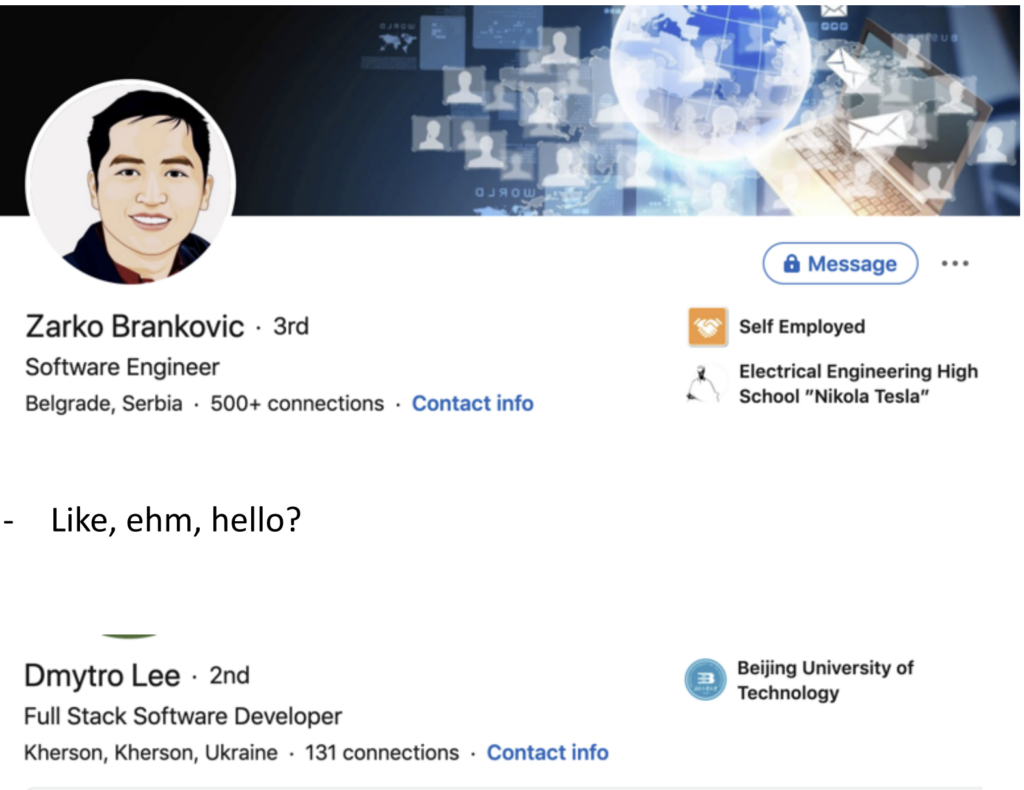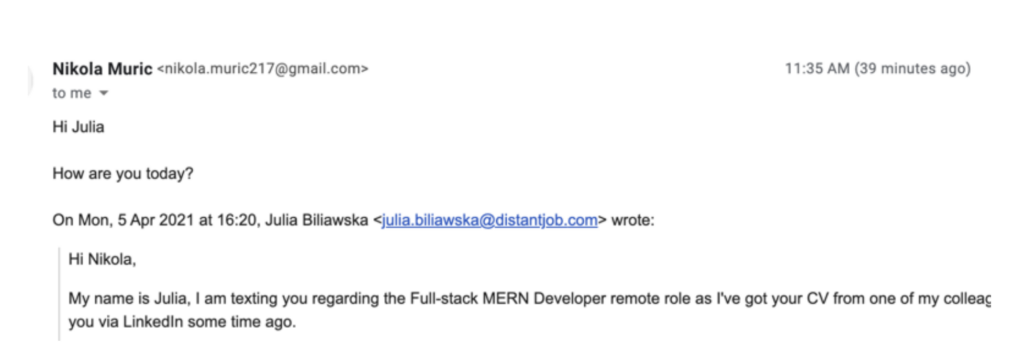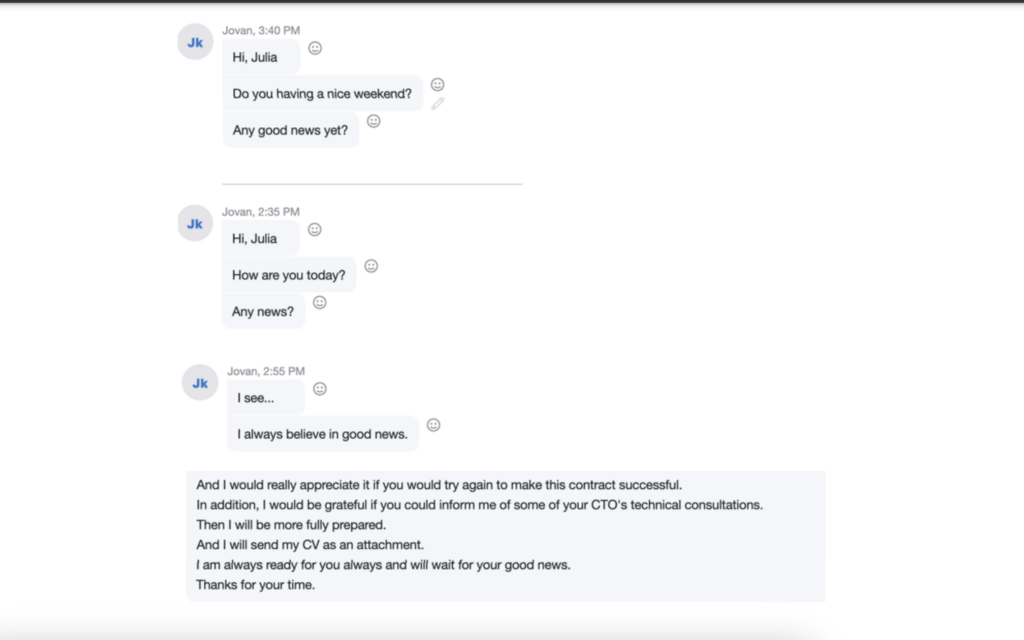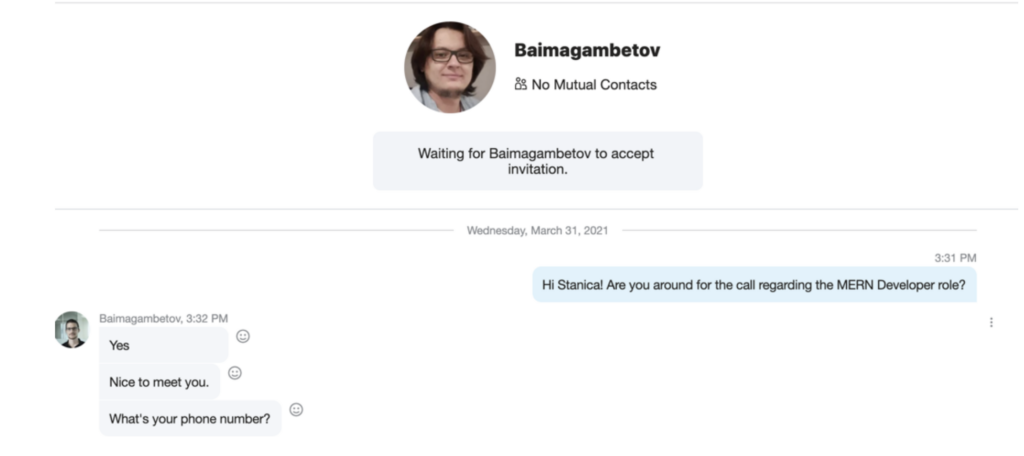In my role as a tech recruiter at DistantJob, I’ve seen many profiles, but recently it looks like there are more fake resumes than real ones. But one recent interaction stands out. I initiated a conversation with Stanica for a MERN Developer role. Our chat was straightforward until, out of the blue, “Stanica” transformed into “Baim Agambetov,” complete with a new face.
It’s been sporadically happening before. A lot. Just not that frequent.
We faced this burst while searching in Serbia (with candidates who pretended to be from Serbia) but occasionally they appeared in Bulgaria, Ukraine, Russia, and Poland.
This might sound like an isolated incident, but it’s chillingly common, especially in the tech industry.
Consider this: more than twenty-two percent of resumes are falsified. The implications? Hiring the wrong person can cost a company up to $25,000 in wasted resources, such as advertising, training, compensation, and benefits. Alarmingly, small businesses face even greater risks, with losses amounting to twice as much per fraudulent scheme.
This isn’t just a statistic—it’s a reality that those of us in recruitment face regularly. So how can we protect ourselves and spot the fake candidates?
How to Detect Fake Resumes During Tech Interviews: What To Watch Out For
- They Appear “Self-Employed” Since Forever
- Their LinkedIn Profiles Have Nothing to Say
- Dmytro “Lee” from Ukraine has a Degree from Beijing University
- Those Lengthy Emails They Send You
- Phone Number? No. Let’s Skype.
- They Don’t Want to Talk About Their Skills
- “Hola”, says a Developer from Germany
- Their Profile is too Good to Be True
The challenges extend beyond just fake resumes. Lee’s experiment highlighted that many tech giants, despite being at the forefront of innovation, haven’t significantly evolved their recruitment practices. The intense competition for “top tech talent” hasn’t translated into a smoother hiring experience. The deception not only strains our trust as recruiters but also threatens the ethical fabric of our profession.
So here are the red flags that will help you detect fake resumes during tech interviews.
1. They Appear “Self-Employed” Since Forever
If you see an application that has all the right things; the qualifications and skills are spot on, go check their LinkedIn profile. If they’re that amazing, why have they been self-employed without any details for 2-3 years?
We do give them the benefit of the doubt in certain cases:
- If they’ve been inactive on LinkedIn for a long time, then it is clear that they could’ve not updated their profile.
- The other aspects of their profile look fine and they’ve been interactive on LinkedIn with various groups/people from the same field. You can check this in the “activity” section in their profile. If the profile is locked, check their number of connections or add them to know more. Dig as deep as possible to clear your doubts.


2. Their LinkedIn Profiles Have Nothing to Say
If there’s very little information on their LinkedIn profile, it’s a red flag. You’ll probably see just their employment start and end dates. You’ll also see a lot of irrelevant people in their networks.
Dig a little deeper if you see such a profile. Get to know the candidate a little more by talking to them over a video call.

3. Dmytro “Lee” from Ukraine has a Degree from Beijing University
We, at DistantJob, certainly love diversity. But the existence of a Dmytro Lee from Ukraine with a tech degree from Beijing is very unusual. This profile is staring right back at you with ‘’SCAM’’ written all over it.

With such profiles that make no sense, don’t even bother. There’s no way that a Ukrainian-Chinese Dmytro Lee with 131 connections is legit. If you see a profile that has weird name, place and education combinations, we recommend you to look further into their profile. It is possible for a person to have such diversity in their educational and professional background but it is rare. Perform a small background check if the profile is legitimate.
4. Those Lengthy Emails They Send You
If you asked for just their resume and want to schedule a call but they send you the history of how Spanish Flu killed a 100 million people between 1918-1920, then there’s a scammer being what they’re best at – oversmart.
Let’s go back to Stanica for a moment. Here’s the screenshot of an email I received from him.

If you are done cringing at Stanica’s blatant giveaway with “Thanks for your kind message”, move on to “Hi Client”. Caught in the act. No actual candidate ever writes an email like this.

“Nikola” totally ignored my message and just sent me a “how are you today?” as if we were real-time chatting.
Here’s a list of more “weird” communication from the others that helped us spot the scammers and when we dug deeper, they were confirmed as scammers.
- The grammar is almost always off.
- The way they communicate is very different from how people from their region usually talk. This is not to say that it’s not possible for them to have a different accent or a different way to write but generally speaking, it’s rare.
- They use “How is your weekend” a lot. We understand this can be a common phrase to start a conversation but not all the time. No matter what, it is always better to get on a call before jumping to conclusions in such cases.


Also, a certain “Nikola”, who was supposed to be from Serbia, just got busted. Here’s how:

Your email tracking software can help you with finding many scammers. This is possible only if they haven’t changed the visibility settings at their end.
More so, the software would show you if emails were read from several locations. It reports the location associated with your recipient’s IP address, which in this particular case indicates that my email was either forwarded to someone else or that there are actually more than one person having access to this inbox. Scammers might invest in a good VPN but wouldn’t that be another sign of a person thinking things up? In any case, while dealing with scammers, you may actually face a team of people working on the deal.

You can see I was messaging Stanica, who accepted my request and responded to my message. Now he’s deleted my request, changed his name and profile picture, and is ready to roll. Stanica’s LinkedIn profile was deleted, too. I tried searching for Baim Agambetov on Linkedin but it’s not there.
5. Phone Number? No. Let’s Skype.
Ask them for their phone number and they’ll be quick to talk about Skype. The scammers do this because a phone number will give away their actual location. If they are over smart, they will provide you with a number that won’t work. Why? They’ll blame the provider, of course.
We have no problem with Skype and Zoom calls but it is a very good idea to ask for their phone numbers just to see how comfortable they are in providing the same. Do they make excuses? Do they say they will give it to you later? If yes, then there’s a problem.
Also, it is worth noting that while they might not give you their phone number, they’ll ask you for yours and then dial in using software.
6. They Don’t Want to Talk About Their Skills
They are not necessarily technical people. When you start asking questions (I mean, something more specific about their experience), they will start sounding uncomfortable.
“Oh, I will share the details after the call. I can send you the document with all my projects”, is what you’ll hear a lot if you’re in conversation with a scammer. This is not a professional way to deal with interview questions, even if you are not a scammer.
In many instances, candidates simply hung up when they were asked technical questions. No wonder, they turned out to be scammers.
7. “Hola”, says a Developer from Germany
Well, scammers might not use their native language if they’re pretending to be from elsewhere but their accent is a dead giveaway. Pay attention to how they talk. The grammar and the accent are easy hints to determine where they actually are from.
The DistantJob recruitment team always gets on a call with candidates, even if they just “appear” to be scammers. You’ll never know for sure until you hear or see them. Once you hear their accent and they start avoiding certain questions, you’ll be able to catch them.
8. Their Profile is too Good to Be True
We’ve all come across them: resumes that read like the curriculum vitae of a tech prodigy. These are the ones that claim expertise in every conceivable programming language and a work history that would make even the most seasoned professional green with envy.
While it’s possible for a candidate to be exceptionally skilled, it’s essential to approach such profiles with a healthy dose of skepticism. Remember, if something appears too perfect, it’s worth a second, more critical look or at least, a more rigorous interview.
Not Every Suspect is a Scammer
To avoid being a victim of this kind of fake tech candidate scam in the IT industry, it is important that you go for a specialised remote recruitment agency like DistantJob.. All of the points mentioned above are indicative of a pattern that has been experienced and observed by the DistantJob recruitment team. We recommend you do your own research on each profile you screen before deeming it a scammer’s profile.
Once you see the red flags, get on interview calls while still keeping an eye on the profiles every day (lest they change their name and profile picture as Stanica did!). Check for consistency and perform a small background check in advance to be sure.
At DistantJob, we understand that,
- Not everyone is aware of common or not-so-common names or surnames in some countries.
- Spotting broken English is very subjective and depends on your own level too.
- People travel and people move places. They learn new languages. So, someone with an uncommon name living in one place and having a different educational background doesn’t really mean anything unless you’ve done other background checks and interview calls.
What are My Best Practices for Tech Recruiters To Ensure a Genuine Talent Pool?
- Comprehensive Background Checks
Before diving deep into the interviewing process, invest in a thorough background check. This should not only verify previous employment but also educational qualifications, certifications, and any criminal records. Partnering with reliable third-party agencies can streamline this process. - Technical Skill Assessment
Make use of technical assessment platforms or coding tests to evaluate the candidate’s technical aptitude. These platforms often have built-in anti-cheating measures, ensuring the authenticity of the results. - Dive Deep During Interviews
When discussing a candidate’s past projects, ask for specifics. This can include challenges faced, solutions implemented, and their role in the project. Genuine candidates will provide detailed answers, while impostors may falter. - Reference Checks
Directly contacting past employers or colleagues can provide valuable insights into the candidate’s skills and work ethics. Listen for inconsistencies between the reference’s account and the information provided by the candidate. - Profile Scrutiny
When a resume appears too polished or packed with every possible tech skill, it could be a red flag. Cross-check their LinkedIn profiles, look for recommendations, and scrutinize any gaps in their work history. - Consistent Communication
Keep the lines of communication open. If someone is impersonating another, they may slip up over multiple interactions. This includes mixing up details, having different communication styles, or sharing inconsistent narratives. - Stay Updated on Industry Trends
As the tech world evolves, so do the tactics employed by those looking to deceive. Staying updated on industry trends, common falsehoods in tech resumes, or emerging deceit tactics will keep you one step ahead. - Collaboration is Key
Engage with fellow recruiters and HR professionals. Sharing experiences and pooling knowledge can uncover patterns or familiar deceptive practices that others have encountered.
Real-Life Scammers Caught by the DistantJob Recruitment Team
Due to recent insufficiency caused by scammers😀, I thought it would make sense to share their profiles with all of you so that we could maybe define common traits, patterns, signs, etc. Before the actual phone call, any guess is just a guess, of course, but this, hopefully, will help you spot a scammer or define things to watch out for (and, eventually, save some time when approaching people on LinkedIn).
Below are the Skype IDs of the scammers who were caught by the DistantJob recruitment team.
Some of the scammers deleted their LinkedIn profiles but those that still exist have been listed at the end of the article. We highly recommend reading everything so that you know the telltale signs of scammers and protect yourself from fraud.
(For the uninitiated, Greenhouse is an ATS and recruitment software.)
Disclaimer:
DistantJob does not intend to leak anyone’s private/sensitive information with this article. If you see your profile/email/skype or any other information in this article, your account has been hacked/impersonated. We recommend you take the necessary action against the scammer.
Skype IDs of suspected fake tech scammers:
live:.cid.779b2c20fd5614d8 supposedly belongs to Zarko Brankovic
live:.cid.855b1194cce40d3 supposedly belongs to Jovan Kostic
live:.cid.8e0f3eea3ea8f840 belonged to Stanica Vuleta, now belongs to Baim Agambetov (profile deleted)
live:.cid.d5d67367b8cd8490 supposedly belongs to Boris Ganev
live:.cid.f18a15d90a4c4600 belonged to Serhii T, now DannyDavid (and Danny D on google meet)
live:.cid.853a52dd8b978532 supposedly belongs to Dmytro Lee
Several others from other roles and previous searches:
live:milorad.becin2017 supposedly belongs to Miloran Becin
live:.cid.5b41f7cb461fa90f supposedly belongs to Boris Slavko
live:.cid.659f6b90f9505b5a supposedly belongs to Arkagei Popov
live:.cid.128d0a4d51427ab1 supposedly belongs to Bohdan Sydorenko
live:ca765c49af7e77e1 supposedly belongs to Sreten Petrovic (profile deleted)
Disclaimer:DistantJob does not intend to leak anyone’s private/sensitive information with the fake tech candidate scam article. If you see your profile/email/skype or any other information in this article, your account has been hacked/impersonated. We recommend you take the necessary action against the scammer.




